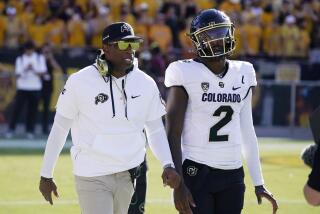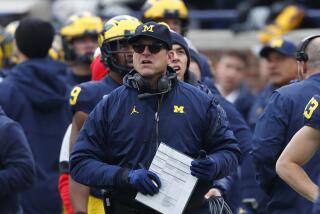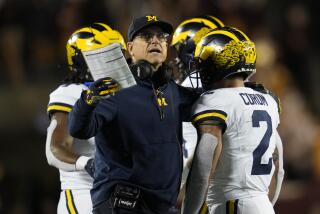Three Oklahoma athletes penalized by university for eating pasta
- Share via
Too much pasta landed three University of Oklahoma athletes on the wrong side of the NCAA rule book.
The unusual case, first reported Wednesday by the Oklahoman, came after the trio attended a graduation banquet in 2013. To restore their eligibility, the athletes each had to donate $3.83 to charity to cover the cost of the pasta. The school reported the situation to the NCAA.
“This is unusual,” said John Infante, a former compliance director at Colorado State and Loyola Marymount who writes the Bylaw Blog. “Very rarely does this come up in terms of banquets and special occasions.”
Former Oklahoma football player Gabe Ikard claimed to be one of the “infamous pasta eaters” in a series of tweets Wednesday.
Teammate Austin Woods also took credit for the meal on Twitter.
“We felt we ate more than $3.83 so we donated $5,” he wrote.
Pete Moris, Oklahoma’s assistant athletic director for communications, declined to comment.
The hungry trio ran afoul of NCAA bylaw 16.11.1.6 that permits schools to provide athletes with “reasonable refreshments” from time to time for “celebratory events.”
“It just makes everybody look bad,” said Jay Bilas, an ESPN commentator and frequent NCAA critic. “The NCAA for some reason can’t seem to stay in its lane. What the players eat is not for the governing body to determine. This is supposed to be for athletic competition and that’s it.”
The NCAA’s 432-page rule book has previously ensnared hungry athletes. Though such violations usually revolve around boosters picking up the tab for an athlete’s meal at a restaurant, Infante said, everything from ham sandwiches to cream cheese have become issues in the past.
In 2000, for instance, then-University of Nebraska quarterback Eric Crouch had to donate $22.77 to charity to cover a ham sandwich and plane ride that were regarded as extra benefits.
Another NCAA bylaw, better known as the bagel rule, permits schools to offer bagels, fruits and nuts to athletes at any time. An interpretation, however, prohibited offering spreads such as cream cheese or peanut butter with the bagels.
NCAA President Mark Emmert frequently cited the prohibition on spreads as an example of the organization’s overreach. The interpretation was eliminated last year.
“We for too long have behaved like 6-year-olds. We can’t afford it. That’s not fair. It’s not a level playing field,” Bilas said. “You know what? Tough. If you can’t afford to give your players the right nutrition, that’s not everybody’s problem. Nobody has restrictions on the facilities you can build, but there are on what you can feed the athletes.”
To Infante, the Oklahoma pasta situation is an example of the challenges presented by Emmert’s efforts at reforming the NCAA.
“I’m sure if there was a proposal to get rid of it, somebody would have an excellent reason where it would lead to the end of the world for their team,” Infante said. “That’s what makes it so difficult to slim down this rule book that’s been so built up over the years.”
An NCAA spokeswoman wrote in an email that, “While we appreciate Oklahoma’s commitment, there are no NCAA rules regarding portion sizes, and any penalties were determined by the university.”
More to Read
Go beyond the scoreboard
Get the latest on L.A.'s teams in the daily Sports Report newsletter.
You may occasionally receive promotional content from the Los Angeles Times.











